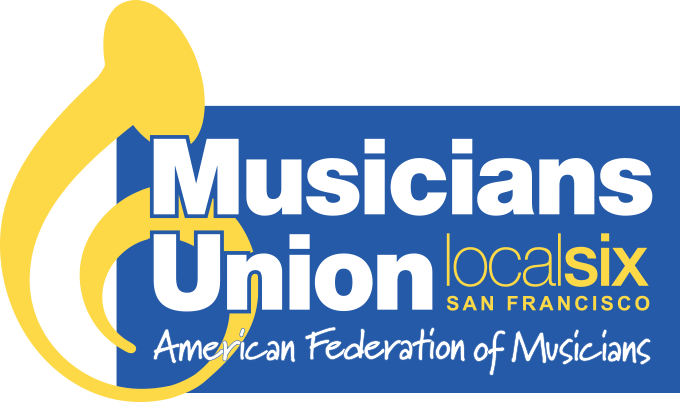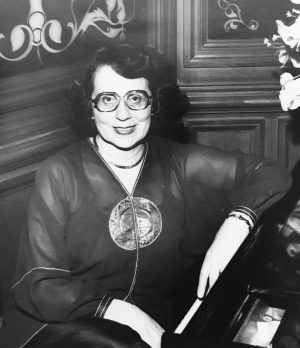
Ethel at the Hilton in the 1970s
by Alex Walsh
I met Ethel Hamilton at the recent Life Member Luncheon in Pacifica. We agreed to do an interview and a few days later were talking about her life and career over lunch at her house in Berkeley.
Ethel Hamilton is one of the most senior members of Local 6—she joined the union in 1935 when she was just 16 years old. The Union president at the time, Mr. Morris, helped her get her first job, working with a trio–piano, cello, and violin—at an exclusive athletic club called The Athens Club in Oakland.
Growing up, Ethel’s house was filled with music from the old country. Her parents had emigrated from Budapest, Hungary. This cultural background was a distinguishing advantage to her when she was asked to audition for various jobs.
Ethel’s father’s profession was tailoring. He graduated from a prestigious tailoring academy in Paris and traveled first to New York and then to San Francisco arriving just prior to the 1906 earthquake. He worked for the original I. Magnin, the upmarket Union Square clothing company in San Francisco. He eventually opened his own tailoring business in Berkeley which evolved into a dry-cleaning business. He was credited for inventing the slogan Cash and Carry.
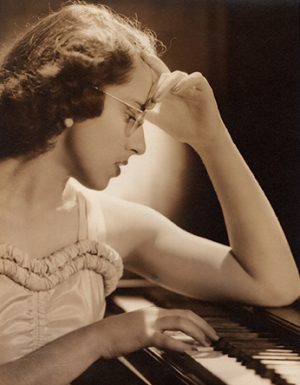
Ethel Hamilton, 16
Ethel says that she has little information about the details of her family’s roots. “My sister Miriam and I kept asking questions but our parents never alluded to much of anything–they always said, ‘That was in the past.’ They were Hungarian Jews and we concluded that in light of the rising anti-Semitism in Europe, their memories wouldn’t have been pleasant.”
Ethel was born in San Francisco and grew up in Berkeley. She began taking piano lessons when she was four years old. At eleven she studied on a scholarship with composer and educator Albert Elkus, who later became head of the UC Berkeley music department. Her parents were very supportive of her endeavors, although when she was offered a scholarship to study in New York, they would not let her go.
After high school, Ethel attended UC Berkeley and lived at home. When she was twenty she began making plans to marry her childhood sweetheart and decided they had to have their own house. Luckily, beginning at age eleven she had been teaching piano for fifty cents a lesson, and along with her salary from ‘casual’ jobs had saved $500, which was enough for a down payment on a home in the Berkeley Hills.
“I knew I was eventually going to marry, and would need a place to live, as well as a place to teach. So when I was a young adult having saved $500, and, you can believe this or not–I put an ad in the local paper as follows: ‘I’m looking for a studio home, for a musician.’ A man called and said, ‘I saw the ad. I’m selling my home in Berkeley. I’m just getting a divorce. If you’d like to look at it we can make a deal.’ So, I drove up–that house is worth over a million today–and after making the down-payment, bought the house for $5,000. When I got married I added my husband’s name to the deed because I thought that was the right thing to do. So, I had a house when we married.”
As a working musician in the 1930s, Ethel was aware of the Works Progress Administration, part of Roosevelt’s New Deal, which created work for musicians and artists, but says she didn’t need it. During WWII, she played many dances for the troops and enjoyed participating in the war effort. Although trained as a classical pianist, she found that she could pick up any style of popular music quickly.
“One night I received a phone call from a musician named Johnny Blake who had a dance orchestra. I was in my 20s at that time. He said, ‘My pianist is ill. Could you possibly sub for him?’ It was in San Rafael at the Bermuda Gardens. I said, ‘Well, I will do my best.’ So, I drove to Marin County, he handed me a thick stack of music, and I got on very well. The first piece was Manhattan: He started, 1- 2- 3- 4, and I came in with the orchestra. I played with them for about three years.”
As a young wife and soon to be mother, Ethel knew she would be spending her life in the Bay Area. “As time went on I realized I would be permanently here because my parents were getting older and they needed me. I thought, ‘Well, I better do what I can to make the combination of family and career work.’
Ethel had her first of four children when she was 23. Her marriage was wrought with tension because her husband was very traditional. “I was dressed up every night, and I was working with men. He wasn’t happy about it.”
Ethel found she had to turn down work because of her marriage. At one point she was offered a steady job at a high end restaurant but the work ended at 1 a.m. The owner invited her to audition for the violinist, who only spoke Greek, and had been unhappy with every pianist with whom he’d worked with. “I auditioned and I ended up working with John Effendras for 21 years, but not at that particular job. It would have been a lot of income but I knew my husband would not be in agreement with the late hours.”
Throughout the 1940s and 50s, Ethel continued to play many casuals, teach private lessons, and raise her family. One night after a job, she was walking down Mason Street in San Francisco when she ran into Henri Lewin, the manager of the Fairmont Hotel. “He looked at me and said, ’Oh, Ethel Hamilton, how nice to see you. I’m going to be the new manager of the Hilton and you’re going to be working for me.’ I said, ‘Well, that’s nice to hear.’ He told me the contractor, Al Wallace, would also be coming into the Hilton, and I would be coming with him. In fact, Al Wallace never hired women, but they insisted he hire me. So, I accepted that job and it was just a perfect professional situation for all concerned.”
Ethel added that she struggled as a woman in the male dominated music industry. She also found that most women she met were competitive and envious within the field of regular, long term musical employment. She did have a few female musician friends, including Martha Wolohan. “She was my lifelong friend. I played many jobs with Martha, perhaps over 200. She played cello and also played piano extremely well.
“Speaking of friendship one thing that was strange to me: I always had a lot of dinners in my home enjoying company outside the workplace, but the musicians’ wives never really entertained. None of them.”
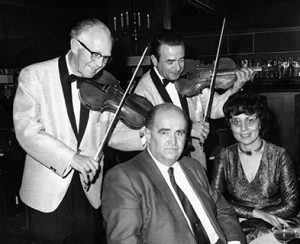
Henry Beuttner, Emil Brueh, and Ethel Hamilton at Chef’s Table—San Francisco Hilton, 1970s
THE HILTON
The construction of the San Francisco Hilton was completed in 1964. “The Hilton was being built on an excellent piece of downtown property in the Tenderloin, but at that time the neighborhood was very dangerous. The Hilton management let me have permanent garage privileges which made all the difference.”
Initially Ethel played as a quartet with three violins. The group was hired to play six nights a week, but the Union objected and said they could only play five nights, but they would be getting the same salary. “They were virtuoso musicians and as a consequence of their decision, the five nights allowed us to play lots of side jobs, casuals, weddings, and receptions.”
During her first week, the famous conductor Arthur Fiedler came in for dinner. “I even remember what I was playing, the Arve Concoction of Sorrento, because we played a little of this, a little of that, whatever the diverse clientele requested. I was working on a brand new spinet. It looked alright in the dining room, but the sound wasn’t strong enough because it was much smaller than a regular piano. When we finished, Arthur Fiedler came over to me and said, ‘That instrument is a disgrace! Tomorrow morning I am talking to the manager and telling him you have to have a grand piano…’ And then he said, ’By the way, I like what you did with that last chord.’”
Three nights later, she had her grand piano. “I was taking the shortcut through the kitchen and the bus boy ran up to me and said, ‘You have big piano! Big piano!’ I walked into the dining room and sure enough, there was a grand piano.”
When the boss asked her how she liked it, he was taken aback when Ethel said she liked her own better. When he explained that they were renting the piano because of her, Ethel suggested they should rent hers instead. “So we made a deal. They brought my Baldwin over and it made a wonderful difference.”
At the end of two years the accountant came in and explained to Ethel that they had been pretty short-sighted; instead of paying her rent every month they should have bought their own piano. Ethel offered to sell them hers and was surprised when they said yes. With the rent money she’d been saving and the money from the sale, she bought a Steinway. “It came from the Alexis restaurant at the top of the Fairmont Hotel. They were remodeling and decided to sell it.”
Ethel worked at the Hilton for 22 years. During this time, she became friends with the owner, Conrad Hilton. When Mr. Hilton remarried, he invited Ethel to the wedding in Las Vegas as a guest. She traveled there with one of her sons for the celebration.
Ethel’s first marriage ended in the mid-1950s. Sadly, when she remarried in 1973, her 2nd husband died 18 months later. And then when her parents died shortly thereafter, Ethel was devastated by these enormous personal losses. Although she had opportunities, she never re-married.
Ethel stopped working at the Hilton in 1986. “Things just change, and it was a changing climate for musical venues. At the Hilton, renovation and remodeling were in progress–redesigning the lobby, demolishing that dining room and extending the hotel. One of the violinists in our trio had a stroke. And in general the older generation who cherished our musical repertoire were disappearing as customers.”
Ethel continued working at every opportunity, including a 2-year run at the Palace Hotel in the Garden Court.
TODAY
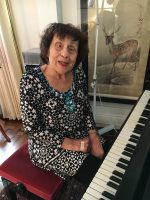
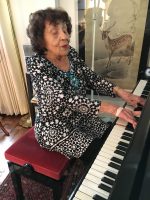 Ethel remarked that she is very grateful for the Union Pension Plan. “I was there when it started. At that time, you could still work and draw your pension. When I turned 65 they offered me $10,000 cash if I would accept a one-time payment. I said, ‘No, I’m still working, I’d rather put it towards when I’m not working anymore.’ I’m getting $570 a month which is pretty good. At least I know it’s there. It’s not a lot of money, but as you know everything helps considering what it costs to live these days.”
Ethel remarked that she is very grateful for the Union Pension Plan. “I was there when it started. At that time, you could still work and draw your pension. When I turned 65 they offered me $10,000 cash if I would accept a one-time payment. I said, ‘No, I’m still working, I’d rather put it towards when I’m not working anymore.’ I’m getting $570 a month which is pretty good. At least I know it’s there. It’s not a lot of money, but as you know everything helps considering what it costs to live these days.”
In the current political climate, Ethel expressed concern about the future. “I see danger ahead. When I was just 10 years old my father said to me, ‘We’re going to have a war with Japan.’ I said, ‘Oh, Daddy, that’s impossible.’ He said, ‘It’s coming.’ And by golly it did. Now I see similarities to the Holocaust era–racicism, religious hatred–it’s a growing phenomenon.”
Today, Ethel continues teaching, enjoying the occasional casual job, soirees with friends, and playing a song or two at weddings. All of her children live in the Bay Area, and her sister lives in Sherman Oaks and she sees them regularly.
Ethel commented that she really enjoyed the recent Life Member Luncheon, “Since I stopped driving I never feel like I have interests in common with anyone anymore. Most everyone I knew is gone yet I always enjoy being with other musicians.”
When I asked her what was her secret to long life, Ethel paused, looked off into the distance, then turned to me and smiled: “Trouble.”
***
How I Made A Grown Man Cry
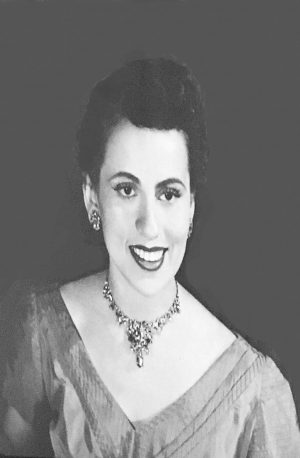
Ethel in the 1940s
At the Palace Hotel in San Francisco there were 9 violins. They built the stage at the center of the big room and had 3 violins facing each direction. The piano was below the stage. The appearance was very effective with the men in black tuxedos. We worked there for two years.
The setting was very challenging: Say, for example, you wanted to play ‘Strangers in the Night’. There was no way to communicate with the violins except musically. I would play the intro as a signal and they knew what to play by the first measure.
I remember when the violinist Henry Beuttner auditioned me. To entertain the audience, he would stroll into the crowd. The pianist would have to pick up what he was playing by ear. When Mr. Beuttner walked in and saw me at the piano, he looked down at me with disdain–I was just a young American woman in his eyes. He was from Germany and spoke perfect English. I could tell he was thinking, “Oh my golly, this is hopeless. She won’t be able to do what I do.”
He said to me, “You know, I’m going to be out on the floor, as far away as forty feet, and you won’t know what I’ll be playing.”
I told him, “Why don’t you go out on the floor and just start anything you want.”
I knew he was thinking, “I’ll start something very simple because I don’t think she’ll know it.”
So, he started and I immediately came in with the accompaniment because I knew very well he was going to be playing Strauss’s Blue Danube Waltz. Then he played something else, and something else. After the fifth song, he slowly came up to the piano and said in a quiet voice, “Do you know Strauss’s Southern Roses?”
Johanne Strauss was the waltz king of Europe. My parents were from Hungary, so I knew a lot of the music. When I played the first few notes, he began to cry. A man crying?
“Oh my God!” he said, “When did you learn this?”
I told him, “I can’t tell you. I’ve just known it all my life.” And that was it. He never hired another pianist, ever, unless I was ill, which was very, very seldom.
***
Magic At The Hilton
“I had many experiences at the Hilton. One of the most exciting was one evening in the 1980s the violinist, Henry, came up to me and said, ‘Ethel, there’s a man at the back table and he would like to sing Be My Love. Would you play for him?’
‘Of course,’ I said.
Henry said, ‘He wants it in C.’
‘Henry, that’s ridiculous,’ I said, ‘that’s the original key and it goes up to high C. He’ll never be able to do it. Ask him if that’s the correct key.’
Henry came back and said, ‘Yes, he wants it in C.’
So, I came in with the intro, the mystery man started singing and right away I had goose pimples on my arm. I thought I was going to fall on the floor! ‘This must be Pavarotti!’ I thought.
Even though I never saw him, we were together like we had practiced for years. When we finished the applause was overwhelming. Everyone in the hallway had stopped to listen.
After that, Henry came up and said, ‘Another man wants to sing, and he wants to sing The Impossible Dream.’
The 2nd man came up to me and said, ‘I’m doing ‘The Impossible Dream.’’
I said, ‘Original key? Because it’s in Bb.’
He said yes and we were together like the first one. It was so perfect! Afterwards, I had to stop playing because it was so beautiful.
Then the 2nd man said, ‘We have to leave, we’re on in 20 minutes.’
It turns out these two were the lead singers from around the corner in the original cast production at the Curran Theater in The Man of La Mancha!
After they left, I didn’t want to play for a while I had to just sit and realize what I’d just heard.”
